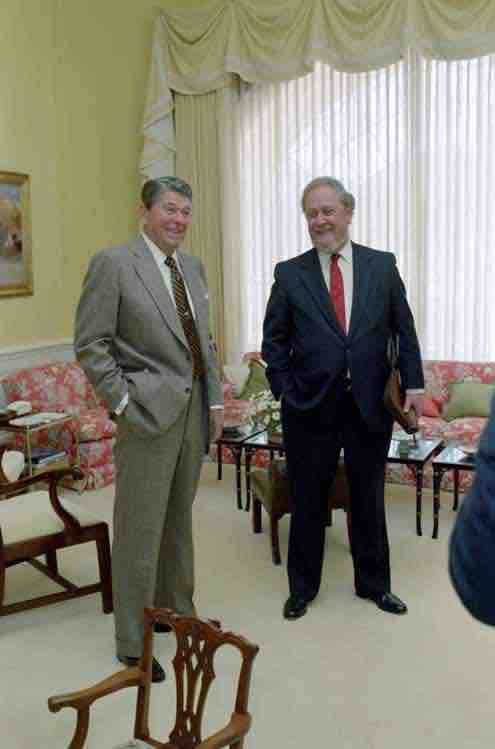The Judiciary
Supreme Court Nominations
In 1981, President Reagan nominated Sandra Day O'Connor to fill the Supreme Court Justice vacancy left by the retirement of Justice Potter Stewart, as he had promised during his 1980 presidential campaign. O'Connor was a conservative Republican and strict constructionist. Though the far-right of the Republican Party was dissatisfied by O'Connor, who refused to condemn the Roe v. Wade decision on that legalized abortion and supported the federal Equal Rights Amendment, Senate Republicans and the vast majority of Americans approved the pick, and she was confirmed unanimously by the Senate. O'Connor would later take more moderate positions.
In 1986, during his second term, the President Reagan elevated Justice William Rehnquist to succeed outgoing Chief Justice Warren Burger and named Antonin Scalia to occupy the seat left by Rehnquist. In 1987, when Associate Justice Louis Powell retired, Reagan nominated conservative jurist Robert Bork to the high court. Within 45 minutes of Bork's nomination to the Court, Democrat Ted Kennedy took to the Senate floor with a strong condemnation of Bork in a nationally televised speech, declaring:
Robert Bork's America is a land in which women would be forced into back-alley abortions, blacks would sit at segregated lunch counters, rogue police could break down citizens' doors in midnight raids, schoolchildren could not be taught about evolution, writers and artists could be censored at the whim of the Government, and the doors of the Federal courts would be shut on the fingers of millions of citizens.
The rapid response of Kennedy's "Robert Bork's America" speech stunned the Reagan White House; though conservatives considered Kennedy's accusations slanderous ideological smears on a well-qualified candidate for the bench, the attacks went unanswered for two and a half months. Bork refused to withdraw himself and his nomination was rejected 58–42; Anthony Kennedy was eventually confirmed in his place.
Other Nominations
Reagan appointed 83 judges to the United States Courts of Appeals and 290 judges to the United States district courts. His total of 376 appointments is the most by any president. Reagan appointed many leading conservative academics to the intermediate United States Courts of Appeals, including Bork, Ralph K. Winter, Jr., Richard Posner, and Frank Easterbrook. Most of these nominations were not controversial, although a handful of candidates were singled out for criticism by civil rights advocates and other liberal critics. Nine nominees for various federal appellate judgeships were not confirmed. In some cases, the nominations were not processed by the Democratic-controlled Senate Judiciary Committee before Reagan's presidency ended, while in other cases, nominees were rejected by the Senate Judiciary Committee or even blocked by unfriendly members of the Republican Party.Both his Supreme Court nominations and his lower court appointments were in line with Reagan's expressed philosophy that judges should interpret law as enacted and not "legislate from the bench". By the end of the 1980s, a conservative majority on the Supreme Court had put an end to the perceived "activist" trend begun under the leadership of Chief Justice Earl Warren. Some argued that the conservatives justices were equally activist, but that their sympathies lay with corporate America rather than with civil rights. However, general adherence to the principle of stare decisis, along with minority support, left most of the major landmark case decisions (such as Brown, Miranda, and Roe v. Wade) of the previous three decades still standing as binding precedent.
Relationship with Congress
Reagan's support for an increased defense budget at the height of the Cold War was supported by Congressional Democrats and Republicans. However, Congress was reluctant to follow Reagan's proposed cuts in domestic programs. In accordance with Reagan's less-government intervention views, many domestic government programs were cut or experienced periods of reduced funding during his presidency. These included Social Security, Medicaid, food stamps, and federal education programs. Though Reagan protected entitlement programs, such as Social Security and Medicare, in one of the most widely criticized actions of his administration, Reagan attempted to purge tens of thousands of people with disabilities from the Social Security disability roles, alleging they were not "truly disabled." Funding for government organizations, including the Environmental Protection Agency, were also reduced. He cut the EPA's budget by 22%, and his director of the EPA, Anne M. Burford, resigned over alleged mismanagement of funds. Tax breaks and increased military spending resulted in an increase of the national budget deficit and led Reagan and Congress to approve two tax increases, aiming to preserve funding for Social Security, though not as high as the 1981 tax cuts.

Reagan with Robert Bork 1987
Reagan nominated conservative jurist Robert Bork to the high court. Within 45 minutes of Bork's nomination to the Court, Ted Kennedy (D-MA) took to the Senate floor with a strong condemnation of Bork in a nationally televised speech.